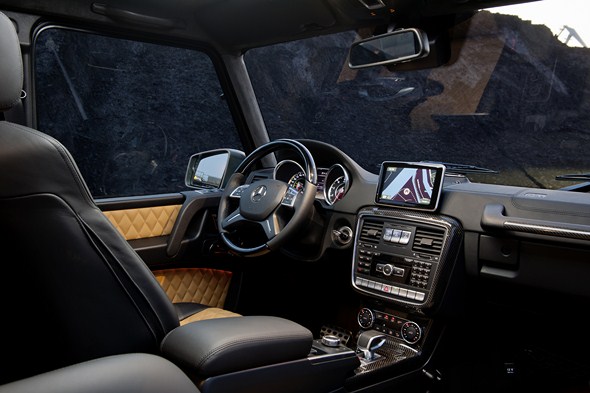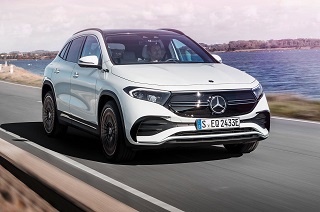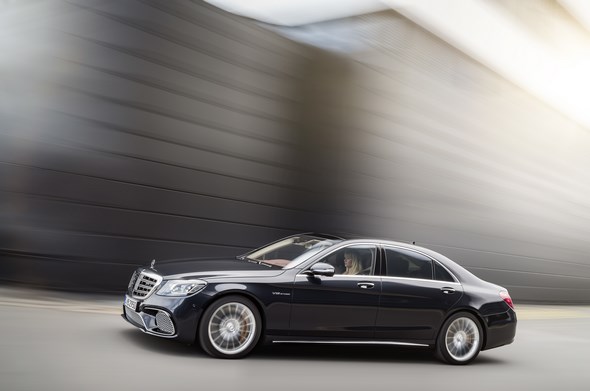G-Class Summit


Mercedes-Benz G 63 AMG and G 65 AMG
Affalterbach – High tech for the AMG off-road classic: the new G 63 AMG impresses with state-of-the-art drive technology, expressive design and increased fuel economy. All this is largely attributable to the AMG 5.5‑litre V8 biturbo engine delivering 400 kW (544 hp) and the AMG SPEEDSHIFT PLUS 7G-TRONIC automatic transmission system.
Even more exclusive is the new G 65 AMG: its AMG 6.0-litre V12 biturbo engine delivers 450 kW (612 hp) and reaches a maximum torque of 1000 newton metres – a record in the off-road segment.
Every new AMG high-performance vehicle offers an outstanding mix of “more power from less fuel” – and the G 63 AMG is no exception. The “strong man”
in the AMG model range has been further enhanced with the state-of-the-art powertrain of the new ML 63 AMG.
The design has been comprehensively reworked, so that, for the first time in the 33-year history of the G-Class, AMG customers can enjoy a raft of future-oriented systems: spray-controlled petrol direct injection, the ECO start/stop function and generator management.

The AMG 5.5-litre V8 biturbo engine develops a maximum output of 400 kW (544 hp) and a torque of 760 newton metres. This enables the new G 63 AMG to accelerate from zero to 100 km/h in just 5.4 seconds, with a new top speed of 210 km/h (electronically limited).
The new G 63 AMG outperforms the G 55 AMG KOMPRESSOR by 27 kW (37 hp) and 60 newton metres. Its direct predecessor was a clear favourite for G-Class purchasers, with a sales ratio of over 40 percent.
Key figures for the G 63 AMG at a glance:
| G 63 AMG | |
| Displacement | 5461 cc |
| Bore x stroke | 98.0 x 90.5 mm |
| Compression ratio | 10.0 : 1 |
| Output | 400 kW (544 hp) at 5500 rpm |
| Max. torque | 760 Nm at 2000–5000 rpm* |
| Fuel consumption, NEDC combined | 13.8 l/100 km |
| CO2 emissions | 322 g/km |
| Efficiency class | G |
| Acceleration 0–100 km/h | 5.4 |
| Top speed | 210 km/h* |
* electronically limited
AMG SPEEDSHIFT PLUS 7G-TRONIC and ECO start/stop function
The vehicle’s driving performance features are matched by its impressive advances in the area of fuel economy. The fuel consumption of 13.8 litres per 100 kilometres (NEDC combined) is a reduction of 2.1 litres on the predecessor model, representing fuel savings of 13 percent.
This reduction can be attributed to the state-of-the-art biturbo eight-cylinder engine, along with the AMG SPEEDSHIFT PLUS 7G-TRONIC automatic transmission system, the generator management system and the ECO start/stop function.
The seven-speed automatic gearbox features three drive modes and an automatic double-declutching function for downshifting, creating an incredible range of variability. In “Controlled Efficiency” (C) mode, the ECO start/stop function is active, shutting down the eight-cylinder engine when the vehicle is stationary.
“C” mode is also characterised by smooth accelerator and transmission characteristics and early gear changes; the vehicle is usually started in second gear in this mode. The AMG instrument cluster includes a green “ECO” symbol, indicating when the ECO start/stop function is on.
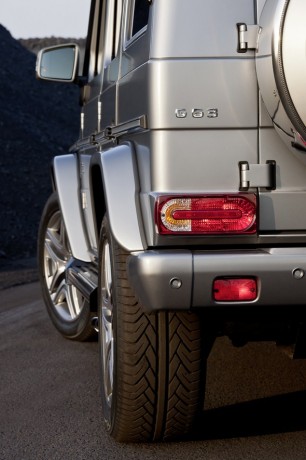
In the Sport (S) and Manual (M) modes, the ECO start/stop function is off, and the engine-transmission combination displays far greater agility. Short, precisely defined ignition and injection retardations mean shorter shift times when changing up at full load.
The efficiency of the AMG SPEEDSHIFT PLUS 7G-TRONIC automatic transmission system is further enhanced with a new fuel economy converter with centrifugal pendulum, friction-reducing bearing and transmission oil thermal management.
The fascination of the characteristic sound of a V8 AMG
A glance at the AMG sports exhaust system will reassure any doubters that all these efficiency advances have not been at the expense of emotional appeal. The twin tailpipes on both sides at the rear put out the hallmark AMG eight-cylinder sound that means so much to the vehicle’s many admirers.
The latest catalytic converter technology is used to ensure that the G 63 AMG meets both the EU 5 exhaust emissions standard and the requirements for the US market (LEV-II standard, on-board diagnosis II and lambda probe diagnosis).
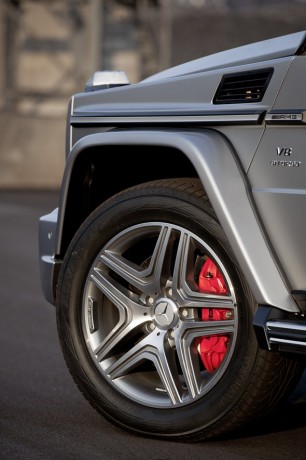
New chassis settings, optimised acoustic comfort
The suspension/damper settings in the AMG Sports chassis have been adjusted for the more dynamic handling characteristics of the new model. To reduce vibration and noise impacts, the design engineers at Mercedes-AMG have also implemented a wide range of NVH (noise, vibration, harshness) measures.
Optimised bearings for the automatic gearbox, transfer case and engine cut vibration and noise levels. All this ensures a more comfortable ride and helps to keep the driver fit and alert, particularly over long distances.
The wheels and brakes are also completely new. The G 63 AMG runs on new AMG 5×2 spoke light alloy wheels as standard equipment. The 9.5 x 20 titanium-grey-painted wheels with high-sheen finish are fitted with
275/50 R 20 tyres. As an exclusive special equipment option, the vehicle can be fitted with matt-black-painted AMG light alloy wheels with high-sheen rim flanges.

The new AMG high-performance brakes deliver top performance in terms of deceleration, adjustable feed and endurance. All-round ventilated, perforated brake discs with dimensions of 375 x 36 millimetres at the front and 330 x 20 millimetres at the rear provide optimum thermal capability and outstanding deceleration values. The front axle is fitted with a six-piston fixed-calliper brake system taken from the ML 63 AMG, with a single-piston floating-calliper system on the rear axle. The brake callipers are painted red around the entire circumference, and are also available in silver.

Fully readjusted ESP® for with more comfort functions
The new generation of the G-Class also offers a range of exemplary safety features. For example, the luxury off-roader has a completely readjusted ESP®, with automatic control systems including the start-up assist and a HOLD function, both for easier hill starts. And in an emergency braking situation, when the driver suddenly releases the accelerator and hits the brake pedal, the brake system increases the pressure in the brake lines and applies the brake linings to the discs. This ensures maximum effect as soon as the brake is applied. This “pre-filling” function supports the brake assist fitted as standard.

For customers ordering the optional trailer coupling, the ESP® trailer stabilisation feature provides increased safety when the vehicle is pulling a trailer. This additional ESP® function detects the trailer as soon as the electric connector plug is inserted in the socket on the towing vehicle.
The ESP® trailer stabilisation system uses the sensors of the ESP®, counteracting any fishtailing of the trailer at speeds higher than 65 km/h by alternating brake application to the left and right front wheels. This is generally sufficient to eliminate the problem and prevent any further risk.

In very severe fishtailing situations, the engine torque is also reduced and the towing vehicle is braked on all four wheels, to get the vehicle back to within a safe speed range as quickly as possible.
Characteristic AMG styling with the new face of the brand
The appearance of the eight-cylinder top-of-the-range model is also definitely up with the times. Following the example of the SL 63 AMG and SL 65 AMG, the G 63 AMG has also taken on the new face of the AMG brand. The high-gloss black “twin-blade” radiator grille with four chrome inserts makes the new G-Class model instantly recognisable as an AMG.

The grille design is consistent with the car’s classic contours, with an off-road look perfectly integrated into the vehicle’s overall appearance.
Another completely new feature is the AMG bumper, with three generously dimensioned openings as airflow inlets for the cooling module. Vertical high-gloss chrome stainless steel inserts create a distinctively masculine look for the G 63 AMG.

New LED daytime running lamps are fitted below the bi-xenon headlamps. As before, only the AMG model has the characteristic wheel-arch flares, stainless-steel running boards and side protective strips with stainless-steel inserts. Other distinctive features include the “V8 BITURBO” logo on the front mudguard and G 63 AMG type plate on the rear door.
Stylish new-look interior with increased comfort
The interior features even more innovations in comparison with the predecessor model. Along with the facelift changes provided as standard, including the new instrument panel and state-of-the-art infotainment and assist systems, the G 63 AMG has an AMG instrument cluster with colour TFT screen, AMG main menu and separate gear display, plus white-lit AMG sills on all doors.

The classy E-SELECT shift lever with the distinctive AMG medallion is a familiar feature from other models such as the SLS AMG. An exclusive on-board environment is created by the designo leather upholstery with ruffled leather door panelling. Options available for an even more stylish interior comprise the AMG carbon trim and the designo Exclusive package.
Exclusive twelve-cylinder performance: the new G 65 AMG
Even more exclusive, and also the world’s most powerful production off-road vehicle, is the new G 65 AMG. With maximum output of 450 kW (612 hp) and maximum torque of 1000 newton metres, the top-of-the-range V12
model delights the connoisseur with its incomparably dynamic handling characteristics.
The G 65 AMG accelerates from zero to 100 km/h in just 5.3 seconds, and has a top speed of 230 km/h (electronically limited). This is the first G-Class vehicle to be equipped with the AMG 6.0-litre V12 biturbo engine, which features new exhaust turbochargers with increased spiral cross-section, flow-optimised wastegate channels, multi-spark ignition with twelve double-ignition coils and a higher-power engine control unit.

The result is enhanced combustion, leading to smoother running and power delivery. The high-quality carbon and aluminium engine cover adds a final visual touch
to this extensive package of new features. As in the G 63 AMG, the AMG SPEEDSHIFT PLUS 7G‑TRONIC automatic transmission system is responsible for power transmission to all four wheels.
The key data at a glance:
| G 65 AMG | |
| Displacement | 5980 cc |
| Bore x stroke | 82.6 x 93.0 mm |
| Compression ratio | 9.0:1 |
| Output | 450 kW (612 hp) at 4300–5600 rpm |
| Max. torque | 1000 Nm at 2300–4300 rpm* |
| Fuel consumption, NEDC combined | 17.0 l/100 km |
| CO2 emissions | 397 g/km |
| Efficiency class | G |
| Acceleration 0–100 km/h | 5.3 |
| Top speed | 230 km/h** |
* electronically limited
In terms of appearance, the G 65 AMG is differentiated from its V8 sister model by the high-gloss chrome radiator grille, the 9.5 x 20 AMG five-spoke light alloy wheels, painted titanium grey with high-sheen finish, its 275/50 R 20 tyres and the V12 BITURBO logo on the mudguards.

Interior features include the welcome display with exclusive AMG V12 BITURBO animation, the designo leather exclusive upholstery and the leather instrument panel trim. A unique special touch is the distinctively V12 diamond design of the seats, including the impressed AMG medallion on the headrests.
This distinctive upholstery feature is repeated on the door central panels. A comprehensive range of standard equipment includes black piano lacquer designo trim features and designo foot mats with a V12 badge. An exclusive special option from the AMG Performance Studio is AMG light alloy wheels, painted matt black with high-sheen rim flanges.

Prices in Germany at a glance (including 19% VAT):
G 63 AMG 137,504.50 euros
G 65 AMG 264,180 euros
Both AMG models are available only in the station-wagon long version.
Market launch is as from June 2012.
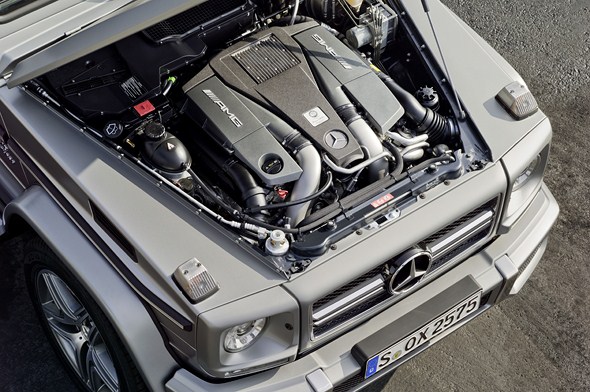
The AMG G-Class: unmistakeable by tradition
The G 55 AMG KOMPPRESSOR has been a favourite since 2004, as a strong character, immune to passing fashions. The AMG 5.5-litre V8 supercharged engine initially developed 350 kW (476 hp), increasing to 368 kW (500 hp) in 2006 and 373 kW (507 hp) in 2009.
The maximum torque of 700 newton metres remained unchanged, along with the vehicle’s supremely dynamic performance values. The G 55 AMG KOMPRESSOR accelerated from zero to 100/km in 5.5 seconds, with a top speed of 210 km/h (electronically limited).
